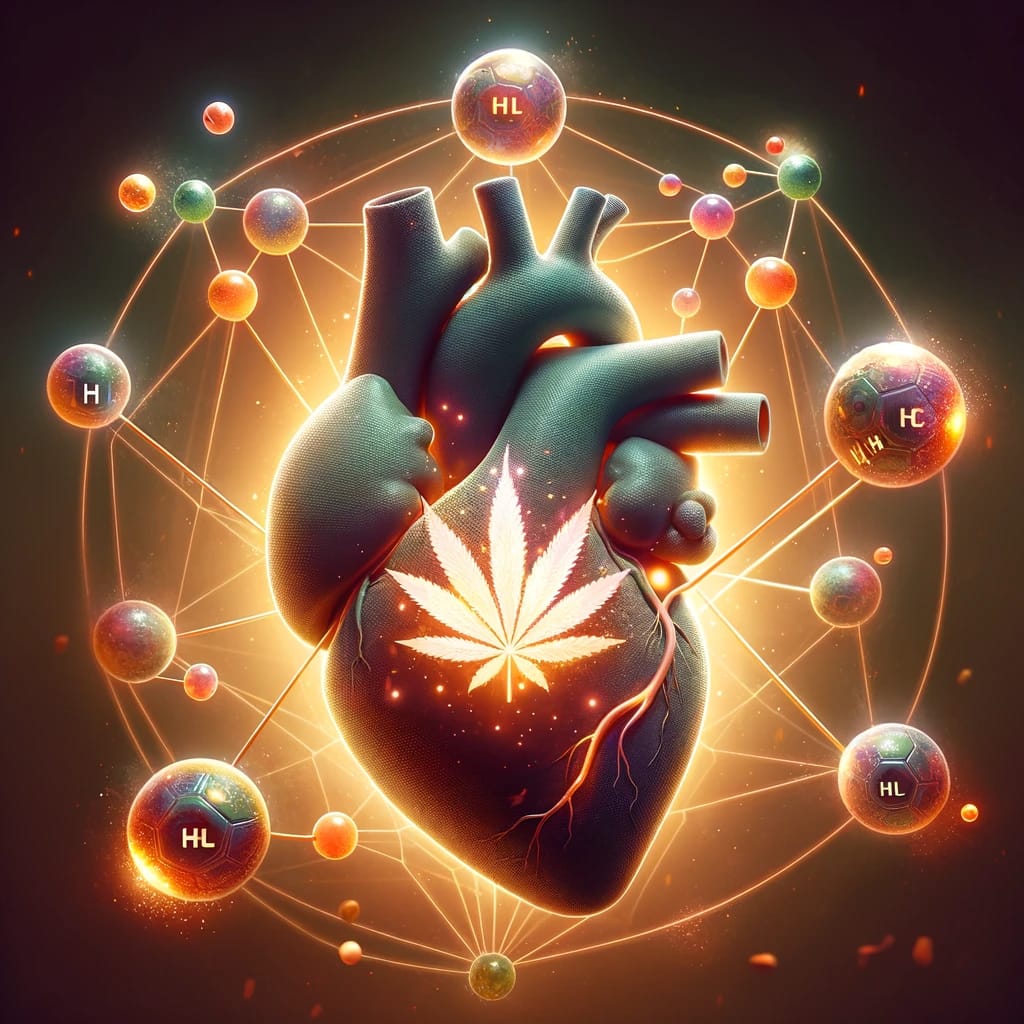Marijuana, often shrouded in controversy and debate, is usually associated with recreational use and its psychoactive effects. The compound at the heart of these effects, Tetrahydrocannabinol (THC), typically doesn’t conjure up images of health and wellness, particularly in the realm of cardiac care. However, groundbreaking research by Miriam Fishbein-Kaminietsky , Mikhal Gafni, Yosef Sarne (academic researchers from
The Adelson Center for the Biology of Addictive Diseases and The Mauerberger Chair in Neuropharmacology, Sackler Faculty of Medicine, Tel-Aviv University, Israel) is challenging this perception, unveiling a surprising facet of THC that could revolutionize how we approach heart health.
This compelling study steps away from THC’s well-known psychoactive persona to explore its potential as a protective agent against heart disease. It’s a shift from the usual narrative surrounding cannabis, delving into a domain where medical science and a traditionally recreational substance intersect in an unexpected way. The researchers have meticulously demonstrated that THC, when administered in ultra-low doses – far below those that induce its characteristic ‘high’ – can have a profound protective effect on the heart.
In a world where heart disease remains a leading cause of death globally, the idea that THC could play a role in heart health is not just intriguing, it’s potentially transformative. It suggests that within the cannabis plant, often vilified and celebrated in equal measure, lies a component that could be harnessed for significant therapeutic benefit. This research opens up a new perspective on THC, positioning it not just as a subject of recreational use but as a potential ally in the fight against one of the most prevalent health challenges of our time.
The implications of this study are far-reaching. It encourages a reevaluation of cannabis compounds, like THC, in a medical and health context, urging us to look beyond established perceptions and consider the untapped therapeutic potential they might hold. It’s a clarion call for more research, more exploration, and perhaps a rethinking of how we classify and utilize the compounds found in cannabis.
A Micro-Dose with Macro Effects
In a groundbreaking shift from traditional perceptions of cannabis and its primary psychoactive component, this study delves into the lesser-known, health-oriented potential of this substance. The researchers embarked on a journey to explore how an ultra-low dose of THC, dwarfed in comparison to recreational use levels (3–4 orders of magnitude lower), could affect heart health. This incredibly microdose, just 0.002 mg/kg, was carefully administered to mice under a range of pre-treatment schedules, all leading up to the induction of myocardial infarction (MI) – a common yet serious form of heart attack.
This choice of dosage is critical and thought-provoking. It stands in stark contrast to the doses that bring about THC’s well-documented psychoactive effects, opening a new avenue of thought about how such a small quantity of a substance can still have a profound biological impact. By administering this dose before the onset of a heart attack, the study delves into the realm of preventive medicine, exploring how THC might offer protective benefits against one of the most significant health challenges.
The study’s design, focusing on various administration schedules, indicates a meticulous approach to understanding not just if THC can be beneficial in a cardiac context, but how and when it should be administered for optimum effect. This exploration is crucial in the context of heart disease, where timing and dosage can be pivotal to the effectiveness of any treatment or preventive measure.
In essence, this research paves the way for a new understanding of THC, beyond its recreational use, as a potential player in the prevention and mitigation of heart disease. By focusing on a micro-dose with seemingly macro effects, the study invites us to reconsider our approach to substances like THC, viewing them not just through the lens of their most well-known effects, but as compounds with a diverse range of potential health applications.
The Results: Beyond Expectation

The study’s results were not just surprising; they were groundbreaking. Administering THC to mice in a timeline ranging from as short as 2 hours to as long as 3 weeks before the onset of a myocardial infarction (MI) consistently demonstrated significant protection of heart tissue.
The most striking findings emerged when THC was given merely 2 hours before inducing a heart attack. This short window was sufficient for THC to elicit a profound protective effect. The mice exhibited notably improved heart function, a pivotal indicator in the aftermath of a heart attack. This improvement was complemented by a decrease in troponin T leakage – a critical marker for heart damage. The lower levels of troponin T suggested that the heart muscle sustained less damage when pretreated with THC, a finding with potential implications for human heart disease treatment.
Moreover, the infarct size, essentially the area of dead tissue caused by the heart attack, was notably smaller in the THC-treated mice. This reduction in infarct size is a significant outcome, as larger infarcts are associated with worse long-term cardiac outcomes, including heart failure. Equally important was the observation of fewer inflammatory cells at the injury site. Inflammation is a key component of the damage caused by heart attacks, and its reduction is critical in mitigating further complications and promoting recovery.
The study not only highlighted the unexpected cardioprotective properties of THC but also showcased these effects across various treatment timelines. The results, going beyond expectations, suggest that THC, when used in specific, controlled doses, has the potential to offer substantial protection against one of the leading causes of mortality globally – heart attacks. This promising discovery opens up new avenues for heart disease research and potential therapeutic strategies, marking a significant step forward in medical science’s ongoing quest to better understand and combat cardiovascular diseases.
Decoding the Mechanism
In the study examining the impact of Tetrahydrocannabinol (THC) on heart health, researchers delved into the biological mechanisms behind THC’s protective effects against heart damage. They discovered that THC primarily interacts with specific receptors located in the heart. These receptors, part of the endocannabinoid system, are known to play a crucial role in regulating cardiovascular functions.
THC’s interaction with these receptors appears to activate certain protective pathways in the body. This activation is critical as it potentially triggers the body’s innate defense mechanisms against heart damage. The study suggests that THC might stimulate processes that help in reducing inflammation, managing oxidative stress, or preserving the integrity of heart cells. These processes could mitigate the damage caused by various cardiac conditions, such as ischemia or heart attacks, by promoting recovery and protecting heart tissue.
Further research could explore how THC’s engagement with these cardiac receptors compares to its interactions in other parts of the body, particularly the central nervous system, where it is well-known for its psychoactive effects. Understanding the balance between the beneficial cardiac effects and the psychoactive effects of THC is vital for developing targeted therapies that maximize heart protection while minimizing potential side effects.
A New Horizon in Heart Health?
This groundbreaking study heralds a new era in cardiovascular health, suggesting that THC, a compound often surrounded by controversy and legal issues, could be instrumental in combating heart disease, one of the world’s leading causes of death. The research lays a foundational stone for future explorations into the practical application of these findings in clinical environments. The potential of integrating THC into heart disease treatment strategies represents a paradigm shift in medical science, illustrating the therapeutic versatility of substances traditionally viewed with skepticism.
The study’s support from esteemed institutions like the Mauerberger Fellowship, The Adelson Center for the Biology of Addictive Diseases, and the Shmuel Shalit Fund highlights the significance of pursuing scientific inquiry in areas that challenge established norms and expand the boundaries of conventional medical wisdom. This approach not only broadens the scope of potential treatments but also enhances our collective understanding of complex biological systems.
In essence, the implications of this study extend beyond the immediate findings. It underscores a broader, pivotal narrative in medical science: that groundbreaking discoveries often emerge from the most unexpected sources. THC, in this context, is not just a substance to be debated in legal and social spheres, but a beacon of hope in the relentless fight against heart disease. This study serves as a clarion call to the medical community and society at large to reassess and broaden our perspectives on substances like THC, recognizing their potential contributions to health and well-being. The journey of discovery is ongoing, and this research is a profound reminder of the endless possibilities that await in the quest for better health outcomes.

